Have you ever noticed how 4 year olds can act self-centered? This is actually a developmental milestone for them!
It can also wreck your 4 year old sleep schedule since they are more independent and self-confident (aka testing boundaries!).
Your child may act afraid to sleep alone, repeatedly come out of their rooms, regress to tantrums at bedtime, take a long time to settle and more.
Preschooler sleep: what you need to know
“OK, let’s start with a troubling fact: Many kids these days don’t get enough sleep. According to surveys conducted by the National Sleep Foundation, about 30 percent of kids under 11, and more than half of teenagers, get less sleep at night than is recommended. And although many sleep experts suggest that young kids go to bed between 6 and 8 p.m., half of American toddlers and preschoolers, and 64 percent of kids in first through fifth grades, go to bed after 9 p.m.” (source)
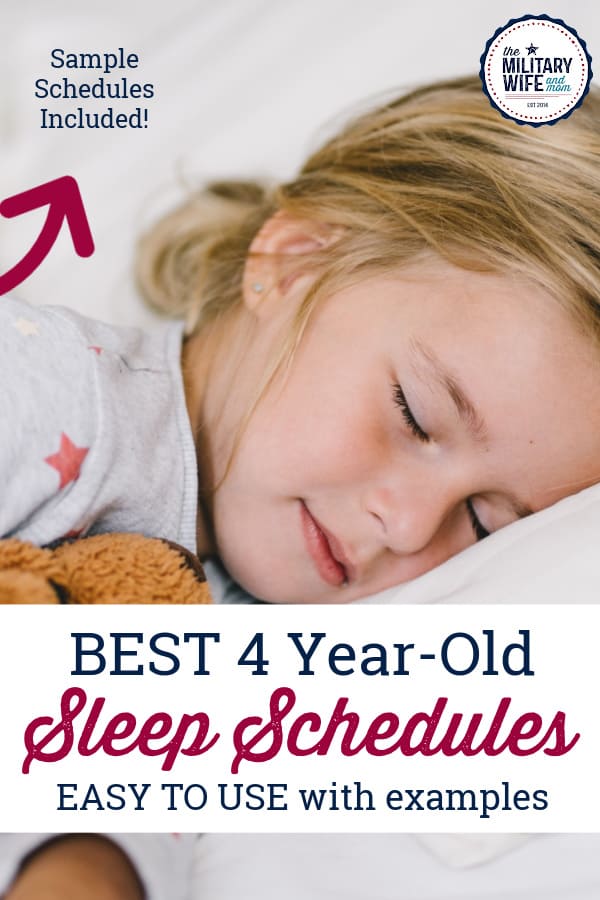
Sleep needs during the toddler and preschool years.
Early bedtimes are crucial during the toddler and preschooler years and are the cornerstone of a good 4 year old sleep schedule.
Many studies show that kids who go to bed later:
- Take longer to fall asleep than kids who go to sleep earlier.
- Wake up more frequently during the night.
- They don’t sleep late enough to make up for their late bedtime.
The amount of sleep a 4 year old needs is approximately 11 – 11.5 hours in a 24 hour period. For example, if your 4 year old goes to bed at 9 pm and wakes at 6 am, that is only 9 hours of night sleep in a 24 hour period.
Sadly, it’s nowhere near enough. And it’s when you will likely see a lot of “4 year old not listening” type situations.
These are all important points to keep in mind when tweaking your sleep schedule.
Sample 4 Year Old Schedules
A consistent sleep schedule can build a strong foundation for healthy sleep habits.
Daily schedule with nap.
- 6:30 am wake up
- 7:00 am eat breakfast
- 7:30 am free play, day care, parks, play dates etc.
- 9:00 am independent playtime
- 11:30 am lunch
- 1:00 pm afternoon nap
- 1:45 pm wake up, snack
- 5:30 pm dinner
- 8:15 pm lights out, bedtime
This is about 10 hours and 15 minutes of nighttime sleep and a 45 minutes cat nap. Avoid longer naps. I like to keep nap time short at this age, since any significant nap will result in a very late bedtime.
Important to note: The time your child falls asleep may not be 8:15 pm (or whatever bedtime you chose), but as long as they are in their rooms quietly laying down with soft toys or a book, it counts as bedtime for me.
Daily schedule without nap.
- 7:00 am wake up
- 7:30 am breakfast
- 8:00 am free play, off to daycare, parks, errands etc.
- 9:30 am independent playtime (child plays alone – how to guide)
- 11:30 am lunch
- 1:00 pm quiet time (lays in bed with books/ soft toys)
- 1:30 pm snack
- 5:30 pm dinner
- 8:00 pm lights out
Once your child stops napping, adjust morning and wake up times accordingly. If your child wakes up too early, visit our guide for troubleshooting.
For example, if your child consistently wakes at 6 am or they need to wake at 6 am to arrive at daycare or preschool, be sure to back up bedtime to 7 pm.
Please don’t fear an early bedtime. Even my older children still head up to their rooms for lights out or quiet play at 7:00 pm / 7:30 pm.
Downtime is so important to help kids’ brains rest, and this can make a HUGE impact on decreasing challenging kid behaviors during the daytime.
More sample sleep schedules for kids:
- Baby Sleep Schedules
- 1 Year Old Sleep Schedules
- 2 Year Old Sleep Schedules
- Toddler Sleep Schedules (Ages 18 months – 3.5 years)
Naps vs. Afternoon Quiet Time
The purpose of naps for a 4 year old: Quick recharge of the brain.
Not all 4 year olds need a nap – especially if they are getting the right amount of nighttime sleep.
However, if you work later into the evenings or participate in evening activities or social events, your child may not get to bed until 8:30 pm or later.
Totally understand.
Real life happens.
If this resonates with you, then your 4 year old likely needs a quick cat nap during the day to recharge their brain, as 13+ hours without rest is simply too long for their developing brains.
Quick answer:
- Child gets 11+ hours of sleep at night = no nap
- Child gets less than 11 hours of sleep at night = 45 min to 1 hour nap
Routines to include in your schedule
“Research shows that routines support healthy social emotional development in early childhood. In particular, children with regular routines at home have self-regulation skills, the building blocks of good mental health. When children learn to regulate feelings and behaviors, it means they are able to identify their feelings and have skills to manage those feelings so that they don’t feel overwhelmed.” (source)
I personally love a good routine and it’s helped immensely to create smoother mornings, quicker bedtimes, and more helpful meal and chore times.
Morning routines.
This is a quick example of a 4 year old’s morning routine:
- wakes up
- gets dressed
- eats breakfast
- brushes teeth
- reads a book
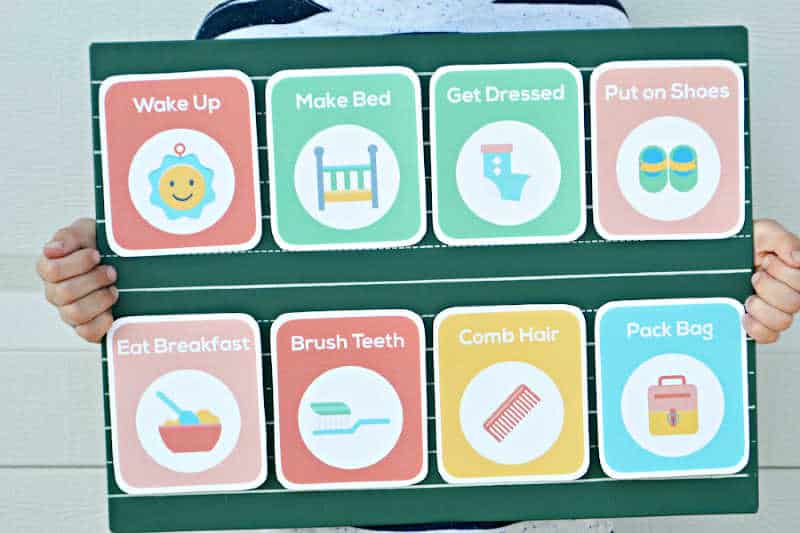
The more routine these tasks are for your child, the easier it is for them to flow through a routine easy without reminders.
And of course, we always use a visual routine because it helps kids succeed.
Check it out 👉 Morning Routine Tips and Tricks Your Kids Will Actually Follow
Bedtime routines.
Bedtime routines offer incredible opportunities to help your child feel connected to you and make some decisions to fill their power cup. Win-win.
Here’s a quick example:
- Bedtime snack
- Brush teeth
- Go potty
- Read books
- Pillow talk (TRY THIS!)
- Pray
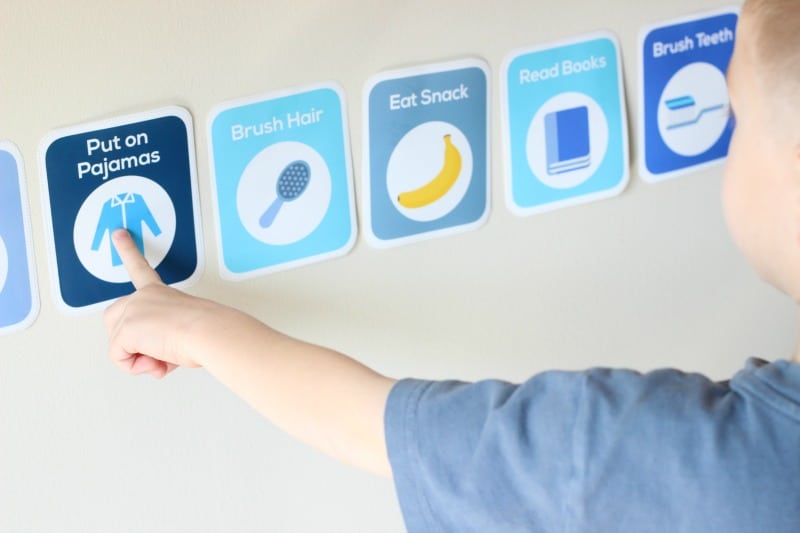
Important tip for smoother bedtime routines.
Micro-decisions: Something that works within your boundaries but your child is able to decide.
Here are some examples:
- It’s time to put on your pajamas. Do you want to put your right arm or left arm in first? Tell me which one to help with.
- It’s time to brush your teeth. Do you want to brush your teeth or do you want me to brush them?
- You want me to brush your teeth. Do you want me to sing while I do it or pretend to be the dentist?
You can get very creative with this.
The goal is simply to help your child make lots of small decisions about their routine as you help them through each task you want done (boundary).
In my experience, kids transition to bed time MUCH EASIER when you use this as a tool.
Meal Routines
“Preschoolers who sing, tell stories and eat dinner with their families tend to be emotionally healthier and better adjusted socially than kids who don’t have such routines, a recent study has found.” (source)
Example of a quick mealtime routine for a 4 year old:
- Set cups, silverware and napkins on the table for all family members
- Sits and eats dinner
- Possibly use these conversation starters.
- Clears plate from table when finished.
- Uses basic manners.
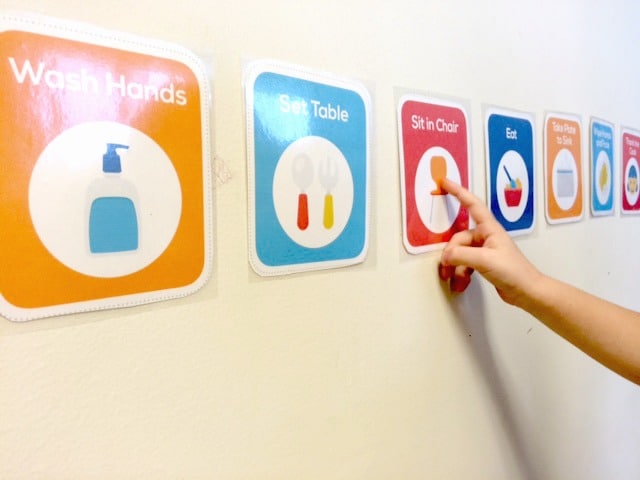
Chore Routines
Excellent ways to get kids involved in chores:
- Minimize the use of the word “chores”
- Emphasize the phrase “family contributions”
- Follow their interests (i.e. if they are interested in the vacuum, let them do that)
- Set weekly goals rather that “do it right now or else!”
Using some printable chore cards can help a lot too. It gives kids a visual cue without you needing to nag.
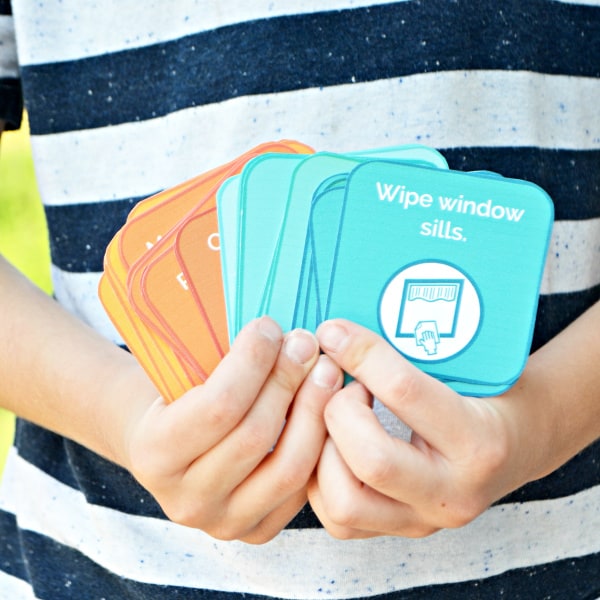
You are the gatekeeper of healthy sleep habits.
It can take up to three weeks to start a new habit and make it stick. If you are making changes to your child’s sleep schedule, give yourself grace and time to adjust.
Print this free printable!
This post comes with a free printable to give you an easy step-by-step guide to raise independent kids. Plus, remember what independent skills are age-appropriate for your kids!
Here’s a sneak peek…
Download Your Free Printable
- Download the checklist. You’ll get the printable, plus join my weekly parenting newsletter!
- Print. Any paper will do the trick, but card stock would be ideal.
- Place it on your refrigerator. Use it as a quick reference to keep parenting simple!
Troubleshooting sleep problems.
- How to respond when your child is afraid to sleep alone
- The real reason why kids never want to go to sleep
- Kids waking up too early? Try these tips
- Child keeps getting out of bed? Try these tips
More on preschoolers?
- 4 Year Old Talking Back? How to Ditch Defiance and Nurture Cooperation
- How to Turn Your High Energy 3 Year Old Into a Better Listener
- Frustrated with Disciplining Your 2 Year Old? Try These Ideas
- 47 Encouraging Phrases for Kids You Have to Try
I've created a free email series just for you! If you are struggling with finding a routine, rhythm or schedule, this email series will help you find one that will work for YOUR family. Yes, really. I've seen my sample routines work time and time again for parents. I know it can work for you too.
This free email series will help you:
- Free sample routines for your child
- Best morning routine tips and tricks your kids will actually follow
- All-time favorite parenting hacks for getting more cooperation at bedtime
- Step-by-step guide for using a printable daily schedule with kids










Leave a Comment